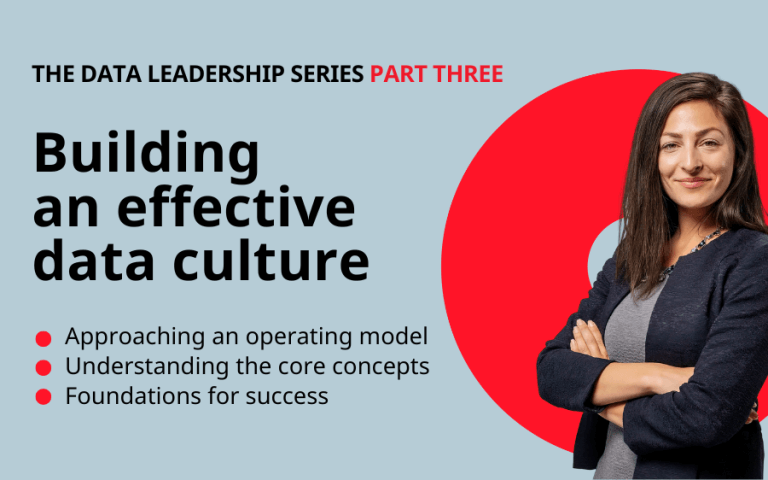Data culture is often informed by organisational culture, but it is also a distinct concept that can be overlooked as unmeasurable or intangible. Taking stock of your own data culture, how you perceive the value of data and how you use it in your day-to-day job, can lead to a much deeper level of engagement with the workforce as you evolve.
The benefits of data-driven cultures
In a global survey of 1100 participants run by IDC in 2023, 83% of CEOs want their organisations to be more data driven. Organisations with “data leading cultures” were:
- 4.6x more likely to use data in making major decisions
- 6.3x more likely to use data in daily meetings
- 8.1x more likely to use data in their approach to work
- 10.7x more likely to use data to support proposals
A 2022 survey of Data and AI Leadership by New Vantage Partners revealed only 19% of organisations reported “having established a data culture” and that, despite a record level of CDOs being appointed, 44% of respondents struggled with CDO turnover. The correlation between data culture and performance is intuitively obvious, but the ROI is difficult to measure. What we can infer is this:
- Data culture is not evolving as quickly – the value and benefits are unevenly distributed.
- Data-driven cultures have superior ways of working that lead to better performance.
Characterising an organisational culture
Understanding data culture is helped by knowing and understanding your underlying organisational culture. When it comes to assessing an organisational culture, here’s a helpful model to evaluate what people do (primary factors) and how work is conducted (secondary factors) which we introduced in the third of our Data Leadership Series online events.
Expert
Project
Relationship
Production
Source: Catherine Hayes, Transition Leadership, Springer 2020.
These Capability Factors are helpful in assessing broadly how organisational culture informs data culture, and how to transition between states. At a more granular level, we can begin to speculate why the gap between the expert-led cultures of data teams delivering projects and relationship or production-led cultures of business teams is widening. The surveys referenced above are reasonably recent and paint the picture clearly: Data & Analytics projects are delivering value, but that value is siloed, and investments in data projects are largely disconnected from the behavioural change necessary to transition an organisation to a data-driven culture.
Aligning the two
It requires Data Leaders to ask themselves an important and multidimensional question: am I slowly killing the culture or is it slowly killing me? If the goals and outcomes of their data strategy and operating model are aligned to an organisational culture that is only paying lip service to being “data-driven” and focussed narrowly on the wins of data and analytics projects, why should they bother going beyond their mandate to improve the data culture of their organisation when that’s not how their success is measured? The grey space between the claim that “83% of CEOs want to their organisations to be more data driven” and the average tenure of a CDO being only 2 years (HBR, 2021) exists because the outcomes and incentives are misaligned.
The reality on the ground is that Data Leaders are second-class citizens with little influence over organisational culture without significant backing from a CEO. If data makes money for the organisation, then the data culture is celebrated. If the organisation wants to increase revenue, and data can do that, it will be green lights for every major D&A initiative that makes its way through committee. The stall point, however, is when value creation and monetisation become confuddled – where data and analytics are not directly revenue attributable. Sure, they may create disproportionate downstream value, but it’s not visible or tangible cash in the hand. This example is used to illustrate how the misalignment of incentives and goals persists.
It is entirely possible for an organisation to take one step forward and two steps back when hiring a CDO if the organisational culture incentivises revenue performance and cost control over value creation and investment in efficiency. The smart Data Leader will use data culture as a barometer for how their budgets should be deployed – after all, putting ChatGPT on top of a data swamp with no governance guardrails makes for a splashy press release, but is akin to rearranging the deck chairs on the Titanic. On the other hand, if you can evidence how data culture is making money, contributing to high performance and creating value at the same time, your tenure will be long.
Next steps
Understanding how your organisational goals and culture shape the objectives of your data strategy and operating model can be supported with a Data Culture Assessment. Get in touch with our team to see if a Data Culture Assessment can help you find the winning edge.
contentS
- The benefits of data-driven cultures
- Characterising an organisational culture
- Aligning the two
- Next steps
Webinar
We discussed this topic – and much more! – with our fantastic guest speakers in the 3rd online event of our Data Leadership Series. Catch up now!


